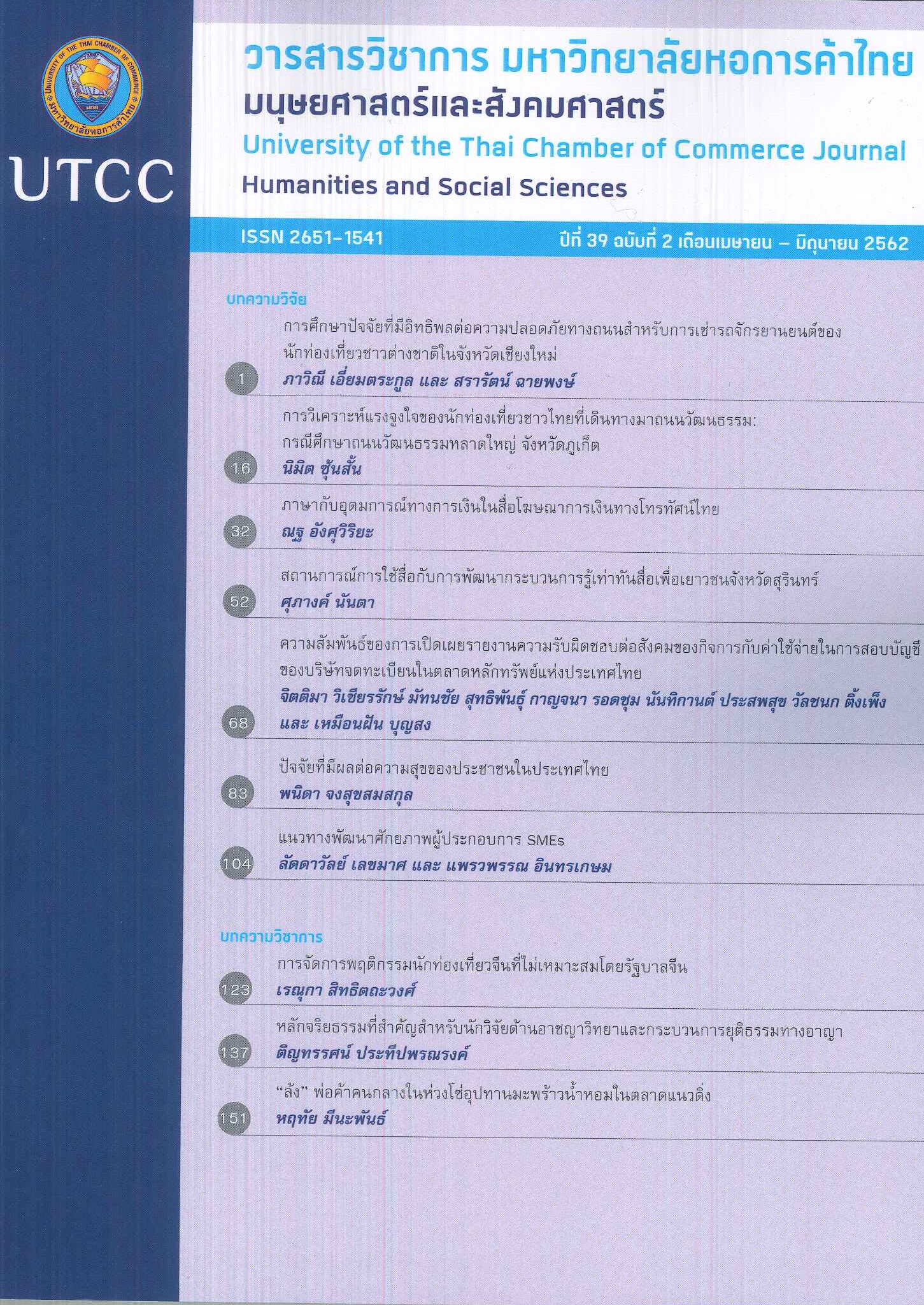The Relationship between Corporate Social Responsibility Reporting and Audit Fees of Listed Companies in the Stock Exchange of Thailand
Main Article Content
Abstract
The study aimed to investigates the extent and amount of corporate social responsibility reporting and audit fees of listed companies in the Stock Exchange of Thailand (SET), and test an influence of level of corporate social responsibility reporting on audit fees of 100 listed companies in the SET. Content analysis was used to quantify the corporate social responsibility reporting in annual reports during 2014 to 2016. Descriptive analysis and multiple regression analysis were used to analyze the data of study. As the results, the study found that the amount of corporate social responsibility reporting was 10.83 scores. The most common reporting was in labor issue following by environmental, social and community, product responsibility, and human right issues. There was increase of audit fees during period being study. Moreover, the study found the significantly positive influence of corporate social responsibility reporting and size of company on the audit fees.
Article Details
ลิขสิทธิ์ของบทความ
ผลงานที่ได้รับการตีพิมพ์ถือเป็นลิขสิทธิ์ของมหาวิทยาลัยหอการค้าไทย ห้ามมิให้นำเนื้อหา ทัศนะ หรือข้อคิดเห็นใด ๆ ของผลงานไปทำซ้ำ ดัดแปลง หรือเผยแพร่ ไม่ว่าทั้งหมดหรือบางส่วนโดยไม่ได้รับอนุญาตเป็นลายลักษณ์อักษรจากมหาวิทยาลัยหอการค้าไทยก่อน
References
มัทนชัย สุทธิพันธุ์, และนฤมล สิทธิเดช. (2559). การรายงานความรับผิดชอบต่อสังคมและผลการดำเนินงานของบริษัทที่จดทะเบียนในตลาดหลักทรัพย์แห่งประเทศไทย. วารสารมหาวิทยาลัยสงขลานครินทร์ ฉบับสังคมศาสตร์และมนุษยศาสตร์, 22(1), 1-23.
วิภา จงรักษ์สัตย์. (2559). การเปิดเผยข้อมูลความรับผิดชอบต่อสังคมของกิจการในประเทศไทย.วารสารศรีนครินทรวิโรฒวิจัยและพัฒนา (สาขามนุยศาสตร์และสังคมศาสตร์), 8(15), 128-144.
สถาบันไทยพัฒน์. (2561). ในมาตรฐาน ISO 26000 กล่าวถึงเรื่องใดบ้าง. สืบค้นเมื่อ 19 กันยายน 2561, จาก https://www.thaicsr.com/2012/10/iso-26000_4840.html
สิรีนาฏ นาคเลิศ, และมัทนชัย สุทธิพันธุ์. (2559). อิทธิพลของการกำกับดูแลกิจการต่อการเปิดเผยข้อมูลสิ่งแวดล้อมของบริษัทที่จดทะเบียนในตลาดหลักทรัพย์แห่งประเทศไทย. จุฬาลงกรณ์ธุรกิจปริทัศน์, 38(149), 1-37
Amin, M. N. (2011). Audit risk model as a corporate social responsibility implementation of certified public accounting firms (evidence from Indonesia). Social Responsibility Journal, 7(3), 509-522.
Anna, S., & Vasiliki, T. (2017). The link between CSR and audit fees: Are audit fees associated with CSR? (Unpublished master’s thesis). International Hellenic University, Thessaloniki, Greece
Ball, R., Jayaraman, S., & Shivakumar, L. (2012). Audited financial reporting and voluntary disclosures as complements: A test of the confirmation hypothesis. Journal of Accounting and Economics, 53(1-2), 136-166.
Beattie, V., & Smith, S. J. (2012). Evaluating disclosure theory using the views of UK finance directors in the intellectual capital context. Accounting and Business Research, 42(5), 471-494.
Chen, L., Srinidhi, B., Tsang, A., & Yu, W. (2012). Corporate social responsibility, audit fees, and audit opinions: Working paper. Fairfax, VA: George Mason University.
Chen, L., Srinidhi, B., Tsang, A., & Yu, W. (2016). Audited financial reporting and voluntary disclosure of corporate social responsibility (CSR) reports. Journal of Management Accounting Research, 28(2), 53-76.
Demartini, C., & Trucco, S. (2016). Does intellectual capital disclosure matter for audit risk? Evidence from the UK and Italy. Sustainability Journal, 8, 1-19.
Frias-Aceituno, J. V., Rodríguez-Ariza, L., & Garcia-Sánchez, I. M. (2014). Explanatory factors of integrated sustainability and financial reporting. Business Strategy and the Environment, 23(1), 56–72.
García, C. B., García, J., López Martín, M. M., & Salmerón, R. (2015). Collinearity: Revisiting the variance inflation factor in ridge regression. Journal of Applied Statistics, 42(3), 648–661.
Gul, F., Chen, C., & Tsui, J. (2003). Discretionary accounting accruals, managers’ incentives, and audit fees. Contemporary Accounting Research, 20(3), 441-464.
Hogan, C. E., & Wilkins, M. S. (2008). Evidence on the audit risk model: Do auditors increase audit fees in the presence of internal control deficiencies? Contemporary Accounting Research, 25(1), 219-242.
Karim, A. K. M. W., & Moizer, P. (1996). Determinants of audit fees in Bangladesh. The International Journal of Accounting, 31(4), 497–509.
Klassen, R. D., & McLaughlin, C. P. (1996). The impact of environmental management on firm performance. Management Science, 42(8), 1199–1214.
Krishnan, G., & Visvanathan, G. (2009). Do auditors price audit committee’s expertise? The case of accounting versus non-accounting financial experts. Journal of Accounting, Auditing & Finance, 24(1), 115-144.
Milne, M. J., & Hackston, D. (1996). Some determinants of social and environmental disclosures in New Zealand companies. Accounting, Auditing & Accountability Journal, 9(1), 77–108.
Mindak, M., & Heltzer, W. (2011). Corporate environmental responsibility and audit risk. Managerial Auditing Journal, 26(8), 697-733.
Organisation for Economic Co-operation and Development. (2011). 2011 Update of the OECD guidelines for multinational enterprises. Retrieved September 19, 2018, from https://www.oecd.org/corporate/mne/oecdguidelinesformultinationalenterprises.htm
Pallant, J. (2010). SPSS survival manual: A step by step guide to data analysis using SPSS (4th ed.). Berkshire, England: McGraw-Hill Education.
Saeidi, S. P., Sofian, S., Saeidi, P., Saeidi, S. P., & Saaeidi, S. A. (2015). How does corporate social responsibility contribute to firm financial performance? The mediating role of competitive advantage, reputation, and customer satisfaction. Journal of Business Research, 68(2), 341–350.
Shah, A., & Khan, S. (2007). Determinants of capital structure: Evidence from Pakistani panel data. International Review of Business Research Paper, 3(4), 265–282.
Suttipun, M. (2014). Corporate characteristics, CSR reporting, and firm financial performance: An evidence of Thailand. Corporate Ownership and Control, 12(1), 844-855.
Suttipun, M., & Nuttaphon, C. (2014). Corporate social responsibility reporting on websites in Thailand. Kasetsart Journal of Social Science, 35(3), 536-549.
Suttipun, M., & Stanton, P. (2012). A study of environmental disclosures by Thai listed companies on websites. International Journal on Global Science and Technology Forum Business Review, 1(3), 105-110.
Stock Exchange of Thailand. (2017). Company listed in the Stock Exchange of Thailand. Retrieved September 30, 2017, from https://www.set.or.th
Uadiale, O. M., & Fagbemi, T. O. (2012). Corporate social responsibility and financial performance in developing economies: The Nigerian experience. Journal of Economics and Sustainable Development, 3(4), 44–54.


